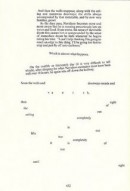 The Browser has been running a provocative series of interviews in which experts discuss the best books in their field.
The Browser has been running a provocative series of interviews in which experts discuss the best books in their field.
This week, Jessica Pressman, who teaches at Yale, analyzes and recommends some electronic literature. The truly electronic side of the conversation is about online texts. Pressman acknowledges that some of these works, like those at Young-hae Chang’s Heavy Industries, are more properly called “a textual performance,” since they incorporate music and graphics and — most crucially, to me — play continuously like a movie. (For a funny example, see “Cunnilingus in North Korea.” If you watch a few of the site’s other works, I think you’ll agree with me that this “revolution” in literature will mostly be a boon to the corrective-vision industry. Good lord.)
Pressman also discusses more conventional work (you know, on paper) that is formally influenced by technology, like the novels of Mark Danielewski. (About his House of Leaves: “It’s a horror story in some ways. My husband started reading it when I was out of town and he had to put it in a drawer and hide it because he got so frightened of it. He wouldn’t read it without my being there.”)
My problem with this, if it’s a problem, is that approaching it as a radical development unique to the influence of technology on literature is misleading on two fronts. First, Pressman admits the influence can work the other way, that online works like Twelve Blue and The Jew’s Daughter owe a lot to the choose-your-own-adventure books that my generation grew up with. And she points out the “hypertextual” elements of works as old as Tristram Shandy and Pale Fire
, meaning, to my mind, that Danielewski might have gotten around to his experiments with or without the dominance of Internet culture. Just as important to his work was the evolution of graphic design, printing techniques and their cost, etc.
I guess I would call some of what’s online — certainly what’s at Young-hae Chang’s Heavy Industries — visual art rather than literature. Maybe that’s splitting hairs. But when Yale’s English department is the one investigating these things, maybe not. If Nabokov eventually gets thrown over for Flash animation, that will be a sad day.

